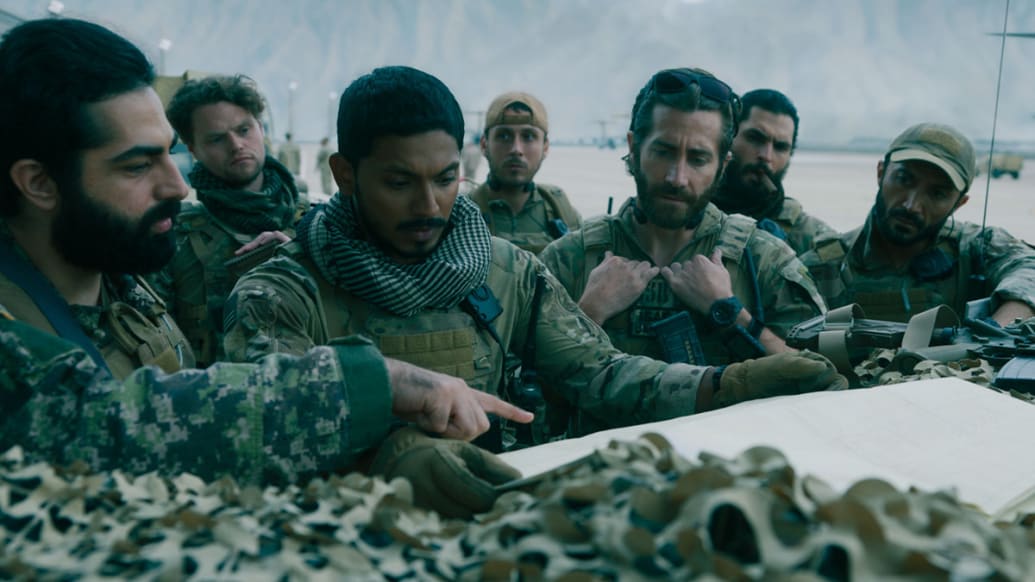Guy Ritchie, an auteur known for his cheeky British gangster films and big-budget Disney adaptations, seems at first glance to be an unlikely director. Treaty. The film, which will hit theaters April 21, is a measured military thriller that celebrates Joe Biden’s decision to withdraw from Afghanistan in 2021, and in the process to leave thousands of local translators stranded, risking their lives to help the American cause.
On closer inspection, however, it turns out to be another of his portraits of brotherhood forged and fortified under fire; this time cast into a familiar Hollywood mold that has done much to energize the politicization of our recent neglect of moral duty.
The opposite of Ritchie’s lighthearted espionage joke Operation Fortune: Ruse de Guerre, Treaty (to prove its authorship, it is officially presented as: Guy Ritchie’s Covenant), allowing his action to preach by simply turning textual notes on and off that provide real-world context for his dramatic story.
Set in Afghanistan in March 2018, the film is about United States Sergeant Major John Kinley (Jake Gyllenhaal), who leads a team responsible for finding and destroying IED factories and other stockpiles of ammunition. Ritchie introduces these characters in snapshots adorned with on-screen title cards, and while this device is a bit cumbersome, it works better when used by these seasoned military veterans to describe the acronyms that go around (like QRF, Quick Reaction Force).
Kinley’s team is dealt a fatal blow at the start of the battle. Treaty, thus forcing them to hire a new interpreter for subsequent tasks. The man who took the job is Ahmed (Dar Salim), a stubborn Afghan who is famous for doing things his own way. Kinley can tell from the start that Ahmed is gifted and tough, and this is proven on their first trip together, when he follows his instincts and offers the suspect additional money to speak up – a line of attack that Kinley explicitly forbids.
However, as his tactic pays off, there is little Kinley can do other than put aside his pride and stare intently at his recruit. someone closer to his equal.
Ahmed is a bit of a joker and yet shows his worth when Kinley gets a clue about two possible IED locations and then correctly realizes that his other translator is trying to ambush them. Joining the Americans after his son was killed by the Taliban, Ahmed is a serious businessman who aligns with Kinley, a husband and father whose determination and seriousness are so extreme (according to Emily Beecham’s wife). even their stab at humor feels like a challenge.
At the second potential IED location, they are put to the test when they find themselves engaged in fierce combat against the Taliban forces, who have poured in from all corners of the dusty area, killing all of Kinley’s men and forcing the duo to take action. in the desert – in a vehicle, and then on foot – to escape death.
While this two-versus-many scenario is fairly conventional by mainstream war cinema standards, that scenario changed a bit when Kinley was injured in an ongoing conflict and Ahmed chose to risk his own life to get Kinley back safely to Bagram. Airbase. In this middle section, Treaty It offers an eerie journey through hostile territory, where virtually no one can be trusted and where detection means instant execution.
Ritchie creates significant tension from these passages, using slow motion (his favorite embellishment) to highlight moments of pain and crisis, and drone footage (almost extreme) to provide an aerial overview of the layouts of battlefields and additionally contextualize his protagonists. small figures advancing in a vast landscape.

hook Treaty Through highly heroic efforts, Ahmed succeeds in his effort by avoiding capture and returning a horribly injured Kinley to his American compatriots by dragging him on a makeshift gurney, pushing him into a rickety car, and rolling him over. rugs to transport secretly by truck. When Kinley wakes up in a provincial hospital, she is shocked and enraged to learn that Ahmed has been forced to fend for himself in Afghanistan, refusing the Special Immigration Visas promised to him, his wife, and their newborn son.
Fleeing because he had a Taliban trophy on his mind, Ahmed was abandoned—something that evoked such guilt, grief, and anger in Kinley that it was inevitable that he would give up dealing with useless bureaucrats to save his translator. Do it on your own, with or without the help of Commander Vokes (Johnny Lee Miller) or private security contractor Parker (Antony Starr).

“I want you to honor the treaty,” Kinley tells Vokes, expressing not only the rules he (and all soldiers) live by, but also the film’s perspective when it comes to America’s obligations to its foreign comrades. Treaty it is simultaneously patriotic and critical of US behavior in Afghanistan, its simple template designed to both admire its heroes and excite them from their heartbreaking exploits, and disgust at the fact that in real life so many translators were let down when we were gone. withdrew from the country (more than 300 people were executed, according to one coda, and thousands are still in hiding).
As portrayed in the screenplay by Ritchie, Ivan Atkinson, and Marn Davies, the blockbuster films made by Kinley and Ahmed have the variety, and Gyllenhaal and Salim sell the intensity, conviction, and virtuousness of their respective characters. Moreover, the judgments reach the sweet spot between fantasy and reality, giving the two protagonists (lionizer) equivalent time in the spotlight, while the former provides an illuminating window to the latter.
Treaty Whether it’s encounters at Taliban checkpoints, gunfights in distant mines, or car chases in rocky mountains, it would have been a fierce polemic if Ritchie hadn’t put everything in fictional terms and given credit for questionable-type set pieces. The result was an old-school action movie swept up by Gyllenhaal’s thrilling movie star return and Salim’s impressively groundbreaking performance, as well as a condemnation of US policy that was painfully targeted.
Did you like this review? Sign up to receive weekly See. Skip newsletter Every Tuesday and find out which new shows and movies are worth watching and which are not.